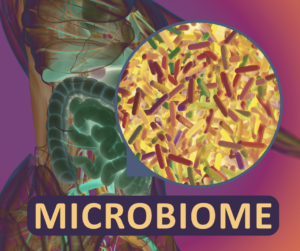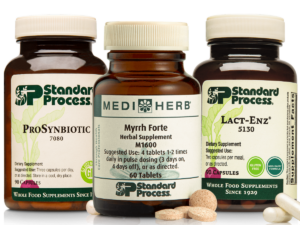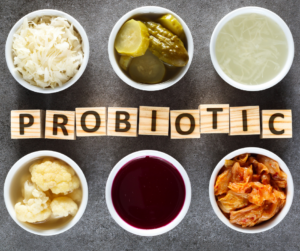By Claire Bacon, ACN, CNC
Taking care of your microbiome can lead to positive gut health, greater immunity, and even better feelings of happiness. Gut health describes the function and the balance of bacteria in the many parts of the gastrointestinal tract. Ideally, our organs, specifically the esophagus, stomach, and intestines, all work together to break down and absorb food without any pain or complications.
All the food we eat is broken down in the gut into more simple forms that can be absorbed by the intestines and delivered throughout the body. Yet, this whole process is only possible with a healthy digestive system. A healthy gut contains “good” bacteria and immune cells that fight off infectious agents like bad bacteria, viruses, mold, and fungi. A healthy gut also communicates with the brain and helps maintain our general health and well-being!

What is the Microbiome?
The microbiome consists of all wanted and unwanted microbes that live in and on our bodies. These microbes live in our gut, skin, eyes, reproductive organs, and even our brain. They are a fundamental part of our existence! Some examples of microbes are:
- Fungi
- Viruses
- Bacteria
- Protozoa
The most useful microbes are good bacteria. They assist with digestion, protection against harmful bacteria, immune system function, and vitamin production in our bodies. The microbiome depends on our diet and environment. So, not only does what we put in our bodies can affect our microbiome, but external factors such as stress or cosmetic products we use can impact our health, too.
Altered or unhealthy microbiomes can cause major issues with gut health and digestion; however, they can extend beyond the gut as well. Unhealthy microbiomes have been linked to:
- Depression and other mental disorders
- Diabetes
- Obesity
- Asthma
- Allergies
- Cardiovascular disease
- Autoimmune disease

How to Keep my Microbiome Healthy?
Keeping a healthy microbiome is important to not only your gut health but your overall health and well-being. There are several steps to take to have a healthy microbiome:
- Avoid everyday toxic chemicals as much as possible.
- Don’t use antibacterial soaps. Regular moisturizing soaps are sufficient for daily use.
- Minimize OTC and prescription medications, as well as shots.
- Avoid touching your face unnecessarily, and minimize any wearing of masks.
- Eat foods rich in fiber, especially fresh fruits and vegetables.
- Eat non-dairy fermented foods such as miso, sauerkraut, kombucha, and kimchi.
- Take probiotics and other supplements to encourage a healthy microbiome.

Supplements for a healthy microbiome:

Taking daily supplements can encourage a healthy microbiome and better your gut health. Several whole-food-based supplements we recommend to support a healthy microbiome are:
- Prosynbiotic is a synergistic blend of four research-supported probiotic strains and two prebiotic fibers to support gut flora and overall intestinal health. It is useful in maintaining a healthy gut environment. Available in office.
- Myrrh Forte is an anti-microbial resin that helps to clear the body of various infections. We especially like this one when gut overgrowth may be affecting your hormonal system. Available in-office.
- Lact-Enz is a blend of Lactobacillus and Bifidobacterium, which are the most important bacteria needed by babies and small children. As we get older, our microbiome becomes more diverse. But these are the two most important when we’re young.
Other Great Choices…
- Zymex (wafers or capsules) promotes a healthy intestinal environment in the intestinal tract. It also encourages a healthy intestinal environment to support a healthy gastrointestinal microbiome.
- Berberine Active is a multi-faceted herbal product. It gives you great anti-microbial action against yeast and fungus, and also helps with blood sugar balancing. So well, that it is often compared to Metformin! Berberine is truly excellent for leptin- and insulin-resistance!
- BioDoph-7-Plus from Biotics supplies multiple strains of Bifidobacterium and Lactobacillus with Streptococcus, along with Inulin, Arabinogalactans, and Marshmallow root.
- Ortho-Biotic from Orthomolecular provides several different strains of Bifidobacterium and Lactobacillus with Saccharomyces boulardii, for a comprehensive microbial blend. Available in office.
Please note that if it ever looks like our website is out of stock, you can always order through our office! (404) 973-0188

In Conclusion:
Taking care of your gut health and microbiome means taking care of your overall health and well-being. It’s important to make sure you’re taking care of yourself to prevent any digestive problems. You can do this by eating a whole food diet, avoiding toxic chemicals, and taking certain supplements.
We hope these tips inspire you to take care of your overall gut health!



